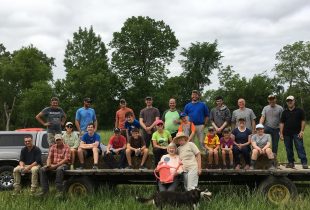The Wetlanders
A look back at a spring fundraising event and the DUC campus chapter that made it awesome.

On a warm spring day, in the midst of exam season, Kathleen Hudyma finds herself inside the school’s university centre, volunteering.
Hudyma, who will graduate from the environmental sciences program this spring, is one of 15 members of the University of Manitoba’s first DUC chapter. “We call ourselves the U of M Wetlanders,” says chapter chair, Megan Porath.
Hudyma, Porath and a handful of other Wetlanders are setting up for the chapter’s inaugural banquet, planned for that night. They’ve been working for over an hour, and will wrap up just before 11:30 a.m. so they can make it to a class. “I’m really excited for the event, but in the back of my mind, I’m thinking about the six papers I need to write,” laughs Porath.
So why are busy university students struggling to balance work, school, and a social life, spending so much time volunteering? “That’s a great question,” says Porath.
Making a chapter
At the start of the winter semester Professor Stephane McLachlan, sent students in his Critical Thinking in the Environment class the course syllabus. Listed under assignments was: “service learning requirement – six hours.”
“It’s like a volunteer co-op program,” explains McLachlan. “Students are encouraged to go out and get practical experience that will be of value to them in their careers,” he says.
Porath elbowed her classmates Lindsay Siebel and Martin Pilon who were in the class with her. “I asked them, ‘Do you want to do this project together? But what I have in mind is going to take way more than the required six hours. It’s going to be a huge time commitment and it’s not going to end this year.’”
Despite her daunting pitch, her friends agreed. And together, they laid the groundwork for the U of M Wetlanders.
The group saw forming a DUC chapter as an opportunity to raise funds for wetland conservation in Manitoba, increase the visibility of DUC on campus, and create fieldwork opportunities for themselves. And it’s that final point that’s piqued interest among chapter members.
Hands-on experience
“There’s only a few courses in our degree that provide fieldwork experience,” says Siebel. One of the few ways students are able to get that experience is by paying to go on placements in places like Churchill; an expensive proposition. “But that’s not an option for everyone,” says Porath.
“It’s difficult, because without field experience, it can be challenging to land a summer or post-graduation job,” she adds.
The Wetlanders say they’ll help address this shortcoming, with support from DUC. Moving forward, DUC will notify Porath about similar volunteer opportunities Wetlanders can take part in, learn from, and potentially include on their resume. “That’s what I’m most excited about,” says Porath.
Last year, Porath and two of her classmates accompanied a DUC biologist on a controlled burn. “We weren’t just there to watch the burn. We had an opportunity to actually participate, and learn about how controlled burning is used as a management tool on wildlife lands,” says Porath.
“It’s really exciting to see students [like the Wetlanders] coming together, and creating those opportunities for themselves,” says McLachlan. “I really am amazed.”
Making the time
When Porath suggested forming DUC’s first Manitoba university chapter to Pilon and Siebel during a condensed semester, she didn’t sugar-coat the amount of time it would take.
Her honesty would have scared some people off, but not Pilon, who up until that point had avoided volunteering during his undergrad. “I felt like I never had the time,” he says. “Looking back now, I know I did.”

©DUC
“It doesn’t have to be a lot of time. But it means so much to organizations like DUC that rely on volunteers. Because we always have the time, we just need to make it,” he adds.
Just the beginning
Later that night, the doors are set to open to the first ever Wetlanders fundraising banquet. Raffles and games flank the room and students wearing green aprons with DUC’s signature duck head, anxiously await their guests’ arrival. Within just a week and a half, their inaugural event has sold out.
Among the attendees is Gerry Brown, a long-time DUC volunteer from Rennie. “It’s great to see the young people getting involved. Because they’re our foundation,” he says.
And according to Porath—it’s a foundation that will continue to grow and gain strength, despite exams, take home tests, and busy student life. “This is our first event. But it’s definitely not our last.”
Because aside from providing students with fieldwork opportunities, the U of M Wetlanders are introducing their peers to the importance of wetland conservation—and to DUC. “DUC is wonderful,” says Porath. “And in order to keep it sustainable, we need to engage the youth early on.”



